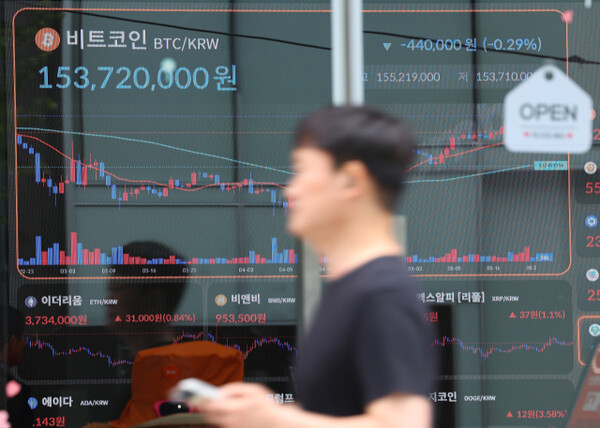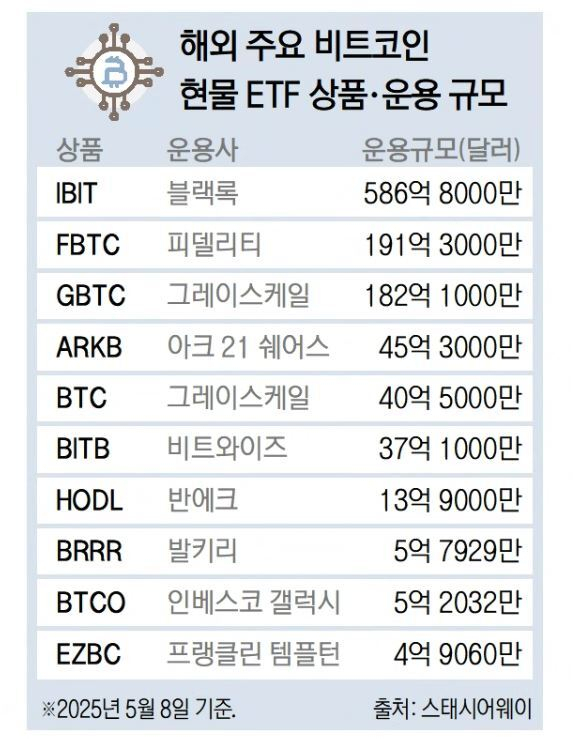
Both ruling and opposition party presidential candidates have proposed the introduction of a Bitcoin spot ETF as a key economic policy. The aim is to incorporate digital assets into the institutional framework and support asset formation for young people and the middle class. Democratic Party candidate Lee Jae-myung proposed it as a youth financial management support measure, while People Power Party candidate Kim Moon-soo promised institutionalization this year as part of a 'middle-class asset growth project'. While seen as a rare policy consensus, its feasibility remains questionable.
■Buying and Selling Bitcoin via MTS
A Bitcoin spot ETF is a product that allows investors to pursue returns linked to Bitcoin's price without directly holding physical Bitcoin. Asset management companies purchase physical Bitcoin as the underlying asset and issue ETFs, which investors can trade through securities accounts like stocks. Investors can easily access this without needing a digital wallet or exchange registration.
The structure that allows easy investment through Mobile Trading System (MTS) or Home Trading System (HTS) could expand the investor base. According to the Korea Securities Depository, stock investors reached 14.23 million by the end of last year. Virtual asset investors already exceeded 15 million by the end of last year. These investors are likely to concentrate their demand on ETFs.
From individual investors' perspectives, convenience and safety increase, and assets are managed within the institutional framework, providing protection. Institutions can also invest in coins without complex exchange registrations. A financial industry official predicted, "Given domestic companies' significant interest in virtual assets, this ETF can likely absorb such demand sufficiently."

■A Turning Point for Bitcoin's Institutional Integration
The launch of a virtual asset spot ETF serves as an opportunity to incorporate Bitcoin into the official asset class under capital market law, recognizing it beyond mere speculation. In January 2024, the U.S. Securities and Exchange Commission (SEC) approved the listing of Bitcoin spot ETFs from 11 asset management companies, including Grayscale, igniting market expansion.
According to Shinhan Securities' analysis of the SEC's institutional stock ownership report (F13), institutions holding Bitcoin spot ETFs in the fourth quarter of last year increased by 37% to 1,576, with institutions holding about 27% of total issuance, indicating an expanding proportion.
Bloomberg reports that the U.S. recorded over 80% of the global Bitcoin ETF market in the first half of 2024, surpassing Canada, which first launched virtual asset spot ETFs. Hong Kong permitted the world's first Ethereum spot ETF in April 2024, and the UK approved Bitcoin and Ethereum spot ETFs for institutional investors.
As of last month 8th, data from asset management platform Stashaway showed BlackRock's IBIT led with $5.868 billion in assets, followed by Fidelity's FBTC with $1.913 billion and Grayscale's GBTC with $1.821 billion.
Han Hwa Asset Management's ETF Head Kim Jung-seop stated, "When the virtual asset spot ETF era begins, coins will be incorporated into institutional investment assets like stocks or bonds, increasing credibility," adding that the domestic financial industry is internally reviewing various simulations and ideas to launch virtual asset spot ETF operations once regulations are established.
■Grilling Steak Without a Frying Pan?
However, risks include Bitcoin's high volatility and reduced control due to not directly holding physical assets. ETF structure risks such as tracking error, price divergence, and fee burdens also exist.
Experts point out that domestic regulations lack the foundation to accommodate such ETFs. The key is 'Authorized Participants' (AP) who adjust price divergence and maintain liquidity, with Goldman Sachs and JP Morgan handling this in the U.S. In contrast, Korean securities firms lack legal grounds to participate in virtual asset markets.
Price divergence refers to the difference between ETF price and actual asset value, which can lead to investor losses. The AP's role becomes crucial for assets with significant price fluctuations. Otherwise, ETFs lose their function as a stable indirect investment method.
Professor Lee Jong-seop from Seoul National University Graduate School of Business warned, "Domestic securities firms can't even directly buy Bitcoin, and can't perform intermediary roles to narrow price gaps - it's like trying to grill a steak without a frying pan," adding that even if an ETF is created, domestic asset managers buying Bitcoin at high prices reflecting the kimchi premium cannot compete with overseas ETFs.








